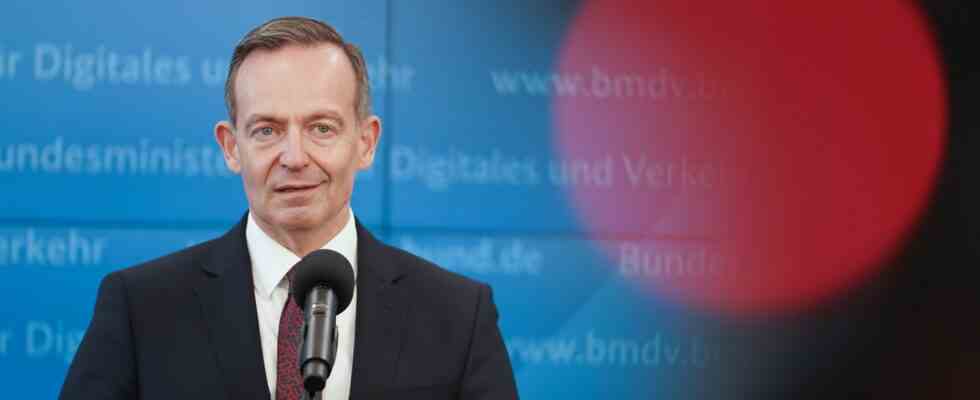As of: 07/20/2022 4:24 p.m
In the debate about a successor to the 9-euro ticket and its financing, Transport Minister Wissing does not see the federal government as responsible. The countries would have to see “how they want to finance it”. They see it differently.
Transport Minister Volker Wissing does not see the federal government as responsible for a follow-up offer for the 9-euro ticket. Instead, the responsibility for further action lies with the federal states. “The local public transport and the tariff structure are a matter for the federal states and not for the federal government,” he said ARD morning magazine. He couldn’t design the ticket at all, the countries would have to do that.
“I can’t suddenly organize public transport from the federal side, specify the pricing or specify the tickets,” said the FDP politician. The constitution provides otherwise.
First, country criticism of the 9-euro ticket
When he proposed the ticket, it was heavily criticized by the countries. The conference of transport ministers of the federal states was outraged by the proposal. “And now everyone is very enthusiastic and wants to have it permanently. Now we have to see how the federal states want to finance it,” said Wissing. The question of how to continue with a new offer after the 9-euro ticket expires in August is primarily about the question of financing.
The federal states necessarily see the federal government on board. A federal-state working group is discussing a continuation, in particular with regard to a socially graded ticket, said the chair of the conference of transport ministers, Bremen’s Senator Maike Schaefer, at the request of the dpa news agency.
The federal government has a duty to finance public transport
“The implementation will only be possible with a massive increase in regionalization funds by the federal government,” emphasized the Greens politician. Wissing obviously wanted to distract people from the fact that he had no serious strategy for a sustainable turnaround in mobility after the 9-euro ticket. According to the regionalization law, the federal government is responsible for financing local public transport, said Schaefer.
The federal government is subsidizing the 9-euro ticket, which is valid nationwide for all local transport, for the period from June to August with around 2.5 billion euros. According to Wissing, the fact that the federal government financed the 9-euro ticket once for three months was a savings proposal against the background of mitigating the effects of the Ukraine war. This, too, was only possible with the consent of the Bundesrat due to the competences of the federal states. The procedure decided by the transport ministers’ conference of the federal states remains the same, Wissing said. According to this, “in the autumn there will be advice on how the structures of public transport should be repositioned”.
Succession possible from the end of the year
Wissing announced yesterday that he considered a follow-up offer possible from the end of the year or early 2023. The transport minister told the dpa news agency that he wanted to wait until the beginning of November for data on the ticket to help with the assessment. At the moment there are still many unanswered questions. There is a lot of speculation, but the answers to the questions are not really known. “That’s why we need the results of the evaluation.”
In view of the high demand, calls for a follow-up regulation to relieve households in the face of high inflation and to promote the transport turnaround are increasing. Among other things, a 365-euro annual ticket or a 69-euro monthly ticket were suggested for a follow-up model.
ADAC warns against a pure price debate
The ADAC motoring club has raised concerns that the discussion about follow-up offers shouldn’t just be about the costs. “The state must help those who find it difficult to continue paying for public transport,” said Transport President Gerhard Hillebrand of the German Press Agency. “But he must also be able to invest sufficient funds in expansion and improvement.” Therefore, sticking to a nationwide 9-euro monthly ticket for everyone is not expedient. This would make it more difficult to improve the range of services and make buses and trains more attractive over the long term.
Hillebrand explained: “For some, the cheapest offer is the best because their household income is low. Others look more at the price-performance ratio.” In many places there is a lack of attractive connections, reliability and flexible offers. “To make the switch from cars to public transport attractive for more people during rush hour, we need further investments in more frequent services, infrastructure renewal and expansion, additional vehicles and digitization.” In the countryside there are still large supply deficits that can hardly be reduced in the short term. “Consumers here are dependent on cars. And that can only mean that mobility by car must remain affordable. Demands to make car traffic even more expensive, for example to finance cheap public transport tickets for everyone, affect the reality of many people’s lives over.”

